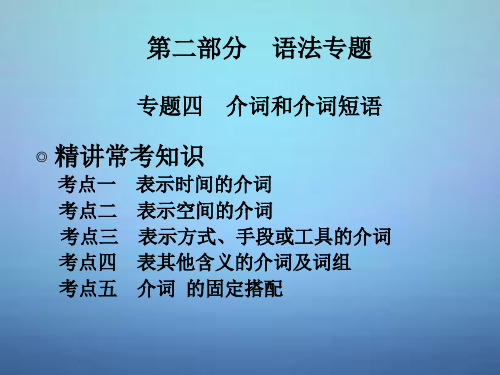中考英语介词复习课件PPT
合集下载
英语中考语法 连词 介词 PPT

考点一、并列连词:表示词、短语、从句或句 子彼此之间具有并列关系。
(二)表示“添加”关系的并列连词 1.and连接并列分句,表示意义的引申,分句间有着平行、因 果、顺接、评论、对比或条件等关系。例: He is a teacher and his wife is a doctor. (平行) Peter heard someone crying for help and he ran out.(因果) He went into the restaurant and found a table by the window.(顺 接) He missed the opening ceremony, and that’s a pity.(评论) Tom likes singing and Jane likes dancing.(对比) Work hard and you’ll make it.(条件) = If you work hard, you will make it.
考点一、并列连词:表示词、短语、从句或句 子彼此之间具有并列关系。
2.在否定句中列举并列成分不用and,而用or。例: We can’t eat or drink in the computer room. There is no air or water on the moon. = There is no air and no water on the moon. 3.both…and…(既……,又……),not only…but also… (不仅……,而且……),连接两个名词或代词,也可连接谓 语动词。both…and…连接名词或代词作主语时,谓语动词用 复数形式;not only…but also…连接两个主语时,谓语动词要 与最靠近的主语在人称和数上保持一致(就近一致),also有 时可以省略。例:
2023年人教版中考英语二轮专题复习课件:介词(21张PPT)

3.Although Peter's mom is _d__is_a_b_l_ed___(残疾的), he still takes pride in her. 4. He's a nice boy. He always talks to others _p__o_li_te_l_y_ (礼貌地). 5. Mr. Hunter often gets up e___a_r_ly___ to catch the
(1)+about: be serious about, be crazy about, be sure about
形容词 的搭配 与句型
1.与介 词搭配
(2)+for:be good/bad for, be famous for, be helpful for, be late for, be ready for (3)+of: be afraid of, be full of, be fond of, be proud of, be tired of
2.以“辅音字母加-y”结尾的单词,把-y变成-i,再加-ly, 如: easy→easily, happy→happily
形容词 变副词 的规则
3.以-le结尾的单词,去e加-y,如: simple→simply, possible→possibly 4.以-ue结尾的单词,去掉-e,加-ly,如: true→truly
3.人物情绪类: angry, excited, happy, nervous ,proud, sad, upset, worried
常考 类别
4.人物性格类: active, brave, confident, patient, shy, smart, strict 5.人物状态类: busy, free, full, hungry, lonely, tired, thirsty
2023年中考英语复习语法专项-介词用法讲解课件

推测
肯定 must be
否定 can’t be
可能 may be
What’s his job? He must be an actor. He can’t be a doctor.
What was his job many year ago? He must have been a student. He can’t have been a teacher.
情态动词的用法:
can, could 的用法
1. 表示能力,意为“能,会” e.g. Can you play basketball?
2. 表示怀疑、猜测,常用于否定句和疑问句中 e.g. He can’t be in the classroom.
3. 表示请求或允许,多用于口语中,意为“可以”,相当于may e.g. You can go now.
can, may, must, need, had better, shall
You _m_u_s_t_n_'_t smoke here.
can, may, must, need, had better, shall
You _n_e_e_d_n_'_t go to school today, it's Saturday.
情态动词的分类:
1. 只作情态动词:must, can (could), may (might) 2. 可作情态动词也可作实意动词:need 3. 可作情态动词也可作助动词:will (would), shall (should) 4. 具有情态动词的某些特征:have to, had better
2. 表示肯定推测 e.g. She must be a student.
初中英语 中考时间介词、方位介词系统梳理(通用版)(共39张ppt)

12
by/until/during
1.by
D. by+将来某个时间(句子常用将来完成时)
A. by +过去时间点 by last year 到去年为止
We will have finish the work by ten o’clock tomorrow.
by the time of yesterday 到昨天为止
I had finished reading the novel by nine o'clock last night.
B. by the time+一般过去时 “到…为止”
By the time I got up , my brother had left home
C. by the end of + 过去的时间点 “在…之前;到…结束时”
every night all the time
2
4
摩拳擦掌
2
5
2
6
since/for/from
1.Since 表示从某时一直延续到至今。 主句用完成时,动词用延续性动词
时间点 He has lived here since 1993
Since+
一段时间+ago I have known him since 7years ago
We had learned over two thousand English words by the end of last term.
到上学期结束时,我已经学了2000个英语单词
2
13
2. A. until 直到…为止 主句用延续性动词, 遵循主将从现原则 He will wait until the rain stops. I waited for my mother until she came home. B. not....until 直到…才 主句用瞬间性动词,遵循主将从现原则 He won’t back until the work is done. I didn’t leave until my mother came home. 拓展:一般情况下,until 、till可以互换,但是当until 放句首时,不能改为till 某些固定搭配中不能互换:from morning till night 从早到晚 up till now 直到现在
by/until/during
1.by
D. by+将来某个时间(句子常用将来完成时)
A. by +过去时间点 by last year 到去年为止
We will have finish the work by ten o’clock tomorrow.
by the time of yesterday 到昨天为止
I had finished reading the novel by nine o'clock last night.
B. by the time+一般过去时 “到…为止”
By the time I got up , my brother had left home
C. by the end of + 过去的时间点 “在…之前;到…结束时”
every night all the time
2
4
摩拳擦掌
2
5
2
6
since/for/from
1.Since 表示从某时一直延续到至今。 主句用完成时,动词用延续性动词
时间点 He has lived here since 1993
Since+
一段时间+ago I have known him since 7years ago
We had learned over two thousand English words by the end of last term.
到上学期结束时,我已经学了2000个英语单词
2
13
2. A. until 直到…为止 主句用延续性动词, 遵循主将从现原则 He will wait until the rain stops. I waited for my mother until she came home. B. not....until 直到…才 主句用瞬间性动词,遵循主将从现原则 He won’t back until the work is done. I didn’t leave until my mother came home. 拓展:一般情况下,until 、till可以互换,但是当until 放句首时,不能改为till 某些固定搭配中不能互换:from morning till night 从早到晚 up till now 直到现在
英语中考语法 介词 课件 (共103张PPT)

两点以后,我们将去上海。
for for+一段时间,达……之久(表示经过了多少时间),可以和 一般现在时、过去时、将来时连用,但经常和完成时连用。
from
用于一般过去、一般现在或一般将来时
since
自从……以来(表示从以前某时一直到现在仍在继续)
since+时间点,主要用于完成时或完成进行时
① We go to school from Monday to Friday. (from…to…“从…到…”,不能用于完成时) ② I have been sick since yesterday.我从昨天起就病了。(强调一直病到现在) ③ The doctor has saved a lot of lives since he became a doctor.
A. during B. after C. for D. in
a few
( D )My brother joined the army last year. A. on B. by C. at D. in
September
( A )— How soon will we get the offer from a new high school? — ________about two months.
after+时间点,用于将来时,表“在……以后”
① I went to the cinema befroe 7 p.m. yesterday. ② After two days, the police finally found the lost girl.
两天之后,警方终于找到那个走失的女孩。 ③We are leaving for Shanghai after two o'clock.
for for+一段时间,达……之久(表示经过了多少时间),可以和 一般现在时、过去时、将来时连用,但经常和完成时连用。
from
用于一般过去、一般现在或一般将来时
since
自从……以来(表示从以前某时一直到现在仍在继续)
since+时间点,主要用于完成时或完成进行时
① We go to school from Monday to Friday. (from…to…“从…到…”,不能用于完成时) ② I have been sick since yesterday.我从昨天起就病了。(强调一直病到现在) ③ The doctor has saved a lot of lives since he became a doctor.
A. during B. after C. for D. in
a few
( D )My brother joined the army last year. A. on B. by C. at D. in
September
( A )— How soon will we get the offer from a new high school? — ________about two months.
after+时间点,用于将来时,表“在……以后”
① I went to the cinema befroe 7 p.m. yesterday. ② After two days, the police finally found the lost girl.
两天之后,警方终于找到那个走失的女孩。 ③We are leaving for Shanghai after two o'clock.
中考专题复习--介词课件

介词
二、方位介词 1. at, in. (1) at 后通常接较小的地点,例:at home 在家, at the bus stop 在公共汽车站。 (2) in 后通常接较大的地点,例:in China 在中国, in the world 在世界上。
介词 2. in, on, to. (1) in 表示在某一范围内部;例:Shanghai is in the east of China. 上海在中国的东部。 (2) on 表示接壤;例:North Korea is on the east of China. 朝鲜在中国东面。 (3) to 表示不在范围内,也不接壤。例:Japan is to the east of China. 日本在中国东面。
介词
4. in, after. (1) in,是指以现在时间为起点的“在一段时间以后”,常用于一般将来时,
用how soon提问。例: He will be back in two days. 他两天以后回来。 (2) after,常指以过去时间为起点的“在一段时间以后”,常用于一般过去时, 用when提问。例: He left on Monday and arrived in Beijing after three days. 他星期一离开,三天之后到达了北京。
He didn’t go to bed until 11 o’clock last night. 昨晚他直到11点才睡觉。
介词
6. “by + 时间点”表示“到……时间为止”。 (1) 如果是将来的时间点,句子时态应用将来完成时。例:
We will have learned 500 words by the end of this term. 到这个学期末,我们将学会500个单词。 (2) 如果是过去的时间点,句子时态应用过去完成时。例: He had read three novels by last month. 截止到上个月,他已经读了三本小说了。
英语语法介词和介词短语课件PPT

A.by
B.in
C.at
D.on
A.in; at
B.at; in
C.in; in
D.at; on
3.She went ____A____ the street to make some purchases. A.across B.through C.over D.above
4.—How do you study English?
—I study English ___A_____ talking with my foreign friends.
语法互动(五)┃介词和介词短语
4.since/for (1)“since+(具体时刻/that从句)”表示“自从……起一直到现在”。 Uncle Li has worked in this factory __s_in__ce___ 2000. 李叔叔自从2000年起就在这家工厂工作了。 (2)“for+(一段时间)”表示“有……之久”。 Uncle Li has worked in this factory ___f_o_r___ over 10 years. 李叔叔在这家工厂已经工作十多年了。
语法互动(五)┃介词和介词短语
以……开始_b_e_g_i_n_/_st_a_r_t_w_i_t_h_ 擅长…… be good at
对……有害处 be bad for
充满 be full of
确信 be sure of/about
习惯于…… _b_e__u_s_e_d_t_o_
对某人要求严格 be strict with sb.
初中英语 语法
课件PPT
语法互动(五) 介词和介词短语
语法互动(五)┃介词和介词短语
中考要求 1.熟练掌握常用介词的基本用法(表示时间、地点、位置、
中考英语总复习课件:专题六 介词

year into 24 solar terms. Xiaoman(a little full) usually falls _A__
May.
A.in
B.at
C.on
D.to
10.(2022·北京)We have history class _A__ three o'clock every Friday
morning of May 30, 2023.
A.in
B.on
C.at
D.from
2.(2023·辽宁大连)—How long have you learned English?
—_B__ six years.
A.In
B.For
C.At
D.From
3.(2023·江苏常州)My father goes back to Nanjing for the Spring
Don't walk without shoes in your house. We have a habit of staying bare feet 4._a_t_ home. The cold passes from feet 5._t_o_ head in no time and that is why we need to wear shoes to stay away from the cold.
because of the “double reduction” policy.
A.in
B.on
C.at
D.to
8.(2022·辽宁盘锦)Vincent sometimes sits _B__ the river and listens to
music.
江苏中考英语语法专项复习课件:专题(05) 介词和介词短语

一段时间,谓语动词为延续性动词 years. 艾丽斯在中国六年了。
I have lived here since 2010.自从 “自……以来”,后接过去的时间点
2010年以来我就一直住在这儿。 since 或时间的分界线,常用于现在完成时,
I have lived here since ten years 谓语动词为延续性动词
o’clock.
我必须在10点前完成所有的工作。
(续表)
词条
用法
举例
“在……之后”,后接时间点, I will go to school after seven o’clock.
常用于将来时
我将在7点之后去上学。
after
后接以过去为起点的时间段, Uncle Tom finished school after three
一般将来时
week. 下周的这个时候我们将在纽约。
(续表)
词条
用法
举例
“直到……”,用于肯定句,表 We must work here until 10 o’clock.
示动作持续到某一时间结束, 我们必须在这儿工作到10点钟。
谓语动词为延续性动词
until not…until…“直到…… The twins didn’t go to bed until 11 o’clock
或晚上
in the morning/afternoon/evening 在上午/下午/晚上
(续表)
词条
用法
举例
“in+一段时间” My father will come back in three days. 我爸爸将在三
表示在一段时间之 天后回来。
in 后,用于将来时,对 —How soon will you finish your homework, Kate?
I have lived here since 2010.自从 “自……以来”,后接过去的时间点
2010年以来我就一直住在这儿。 since 或时间的分界线,常用于现在完成时,
I have lived here since ten years 谓语动词为延续性动词
o’clock.
我必须在10点前完成所有的工作。
(续表)
词条
用法
举例
“在……之后”,后接时间点, I will go to school after seven o’clock.
常用于将来时
我将在7点之后去上学。
after
后接以过去为起点的时间段, Uncle Tom finished school after three
一般将来时
week. 下周的这个时候我们将在纽约。
(续表)
词条
用法
举例
“直到……”,用于肯定句,表 We must work here until 10 o’clock.
示动作持续到某一时间结束, 我们必须在这儿工作到10点钟。
谓语动词为延续性动词
until not…until…“直到…… The twins didn’t go to bed until 11 o’clock
或晚上
in the morning/afternoon/evening 在上午/下午/晚上
(续表)
词条
用法
举例
“in+一段时间” My father will come back in three days. 我爸爸将在三
表示在一段时间之 天后回来。
in 后,用于将来时,对 —How soon will you finish your homework, Kate?
专题05 介词和连词 中考英语语法过关突破课件

初中英语 专题05 介词和连词
知识网络
介词的分类方时 地式间 点介介 介词词 词
介词介词短语b动介e+词词形++容介名词词词+介词
介词的功能定 表语 语
状语 宾语
联合 nei关th系er.:..naonrd...,等not only...but also...,
考点一 介词 1.表时间时,at强调“点”got there at eight this morning. 今天早上我八点到那。 Beijing held the Olympic Games in 2008. 北京2008年举办了奥运会。 The twin sisters were born on a Friday evening. 这对双胞胎姐妹在一个星期五的晚上出生。
并列连词转折关系:but,however等
因果关系:so,for等
连词的分类
选择关系:or,either...or...等
从属连词引 引引 引导 导导 导表 状宾 主语 语语 语从 从从 从句 句句 句tstthhhinaaacttte,, ,,wwift,hhhoeawtuth,gheherwt,等hhewert等hheerre等等
12.at/in the front of 表示“在……里面的前部”,at the back of表 示“在……里面的后部”,in the middle of 表示“在……的中部”。
Xiao Ming sits at/in the front of the classroom. 小明坐在教室前面。 The twin sisters sit at the back of the classroom. 那对双胞胎姐妹坐在教室后面。 The teacher is standing in the middle of the classroom. 老师在教室中间站着。
知识网络
介词的分类方时 地式间 点介介 介词词 词
介词介词短语b动介e+词词形++容介名词词词+介词
介词的功能定 表语 语
状语 宾语
联合 nei关th系er.:..naonrd...,等not only...but also...,
考点一 介词 1.表时间时,at强调“点”got there at eight this morning. 今天早上我八点到那。 Beijing held the Olympic Games in 2008. 北京2008年举办了奥运会。 The twin sisters were born on a Friday evening. 这对双胞胎姐妹在一个星期五的晚上出生。
并列连词转折关系:but,however等
因果关系:so,for等
连词的分类
选择关系:or,either...or...等
从属连词引 引引 引导 导导 导表 状宾 主语 语语 语从 从从 从句 句句 句tstthhhinaaacttte,, ,,wwift,hhhoeawtuth,gheherwt,等hhewert等hheerre等等
12.at/in the front of 表示“在……里面的前部”,at the back of表 示“在……里面的后部”,in the middle of 表示“在……的中部”。
Xiao Ming sits at/in the front of the classroom. 小明坐在教室前面。 The twin sisters sit at the back of the classroom. 那对双胞胎姐妹坐在教室后面。 The teacher is standing in the middle of the classroom. 老师在教室中间站着。
【语法过关】专题06 介词中考英语一轮复习课件

间
He will arrive after three o’clock.
after+时间段, "在……之后", 与过去时连用, 如:
He came back aftertwo days.
after/ in+时间段, "过多长时间以后", 与将来时连用, 如:
in/
I’ll come back in five days.
【答案】D 【解析】句意:诗歌对人们影响很大。例如,白居易的诗歌在今天仍然有意义。考 查介词短语。In the end最后;From now on从现在开始;At first最初;For example 例如。根据“the poems of Bai Juyi are still meaningful today”可知,此处是例举白居易 的诗来说明诗歌对人们的影响很大,For example符合语境。故选D。
on "为,给";表一段时间或距离;表方向,"去, 往
" with
表伴随,"和……一起";"穿,
without 戴"表否定,"不,没有
like
"像…" …一样"
语法图解
满分秘籍
介 词 的 分 类
介 词
介 词 的 固 定 搭 配
易失分点
提分特训
be+形容词/过去分词+介词, 如:be good for对 ...有益, be made from...由……制成
提分特训
instead of 代替,而不是
from now on 从现在起
with one’s help 在某人的帮助下
中考英语语法专题讲解——介词 (共22张PPT)

(不属于该范围)
north of China.
介词
用法
举例
in front of 在……之前(范 There are trees in
围外) front of the room.
in the front 在……的前部( There is a desk in
of
范围内) the front of the
home in China; in the
world
介词 用法
on 指在上面,表示 两个物体接触
over 指在……的正上 方,表示垂直在 上
above 指位置高于,表 示在斜上方
举例 There is a plate on the table. There is a bridge over the river.
between和among的区别
介词
用法
举例
between
两者之间;三者或者以上 事物分别看待,指每两者
之间
between you and me
between meals
among 表示在三者或者以上之间
among the students
across和through,over和past的区别
介词
定句中,表示 10 o’clock.
“直到……才
……”
表示“在……期 He lives with us
间”
during these years.
表示“到……以 by now=so far=until
前为止”与完 now
成时连用
表示从过去某 He has studied
时一直延续到 English since 2000.
中考英语专题四介词和介词短语PPT课件

Sally will arrive in
Guangzhou after 9:00. 莎莉将在9点到达广州 。
before 在……之前。
My mother always goes to work before 7:00. 我 妈妈总是7点之前就去 上班。
Ⅱ. 易混词辨析 between强调在两者之间;from ... to ... 意为“从…… 到……”,强调时间段。 Tom does his homework between 7:00 and 9:00. 汤姆7 点到9点之间做作业。(7点到9点之间的某个时间段在做 ,不一定一直在做)
at the age of 在……岁时
介词
用法
例词/句
用在表示世纪、年 in the twenty’first century 在21
代、年份、季节、 世纪
月份等的名词前; in the 1880s 在19世纪80年代
用在不特定的上午、in 1983 in winter 在1983年冬天
下午、晚上或白天 in March 在三月
Tom does his homework from 7:00 to 9:00. 汤姆从7点 到9点做作业。(从7点到9点一直在做)
【典例精析】
1. Li Yuchun is my favorite singer. I once met her
__________ 2012 in Hunan.
A. to
。
假要去青岛。
after
after后既可以跟时间段, 也可以跟时间点,意为“在 ……后”。后跟时间段时表 示以过去为起点的某一段 时间之后,常用于过去时 ;后跟时间点时,表示将 来的某个时间之后。
Mary got back from the
Guangzhou after 9:00. 莎莉将在9点到达广州 。
before 在……之前。
My mother always goes to work before 7:00. 我 妈妈总是7点之前就去 上班。
Ⅱ. 易混词辨析 between强调在两者之间;from ... to ... 意为“从…… 到……”,强调时间段。 Tom does his homework between 7:00 and 9:00. 汤姆7 点到9点之间做作业。(7点到9点之间的某个时间段在做 ,不一定一直在做)
at the age of 在……岁时
介词
用法
例词/句
用在表示世纪、年 in the twenty’first century 在21
代、年份、季节、 世纪
月份等的名词前; in the 1880s 在19世纪80年代
用在不特定的上午、in 1983 in winter 在1983年冬天
下午、晚上或白天 in March 在三月
Tom does his homework from 7:00 to 9:00. 汤姆从7点 到9点做作业。(从7点到9点一直在做)
【典例精析】
1. Li Yuchun is my favorite singer. I once met her
__________ 2012 in Hunan.
A. to
。
假要去青岛。
after
after后既可以跟时间段, 也可以跟时间点,意为“在 ……后”。后跟时间段时表 示以过去为起点的某一段 时间之后,常用于过去时 ;后跟时间点时,表示将 来的某个时间之后。
Mary got back from the
中考英语语法介词和介词短语总复习完美38页PPT

中考英语语法介词和介词短语总复习 完美
46、法律有权打破平静。——马·格林 47、在一千磅法律里,没有一盎司仁 爱。— —英国
48、法律一多,公正就少。——托·富 勒 49、犯罪总是以惩罚相补偿;只有处 罚才能 使犯罪 得到偿 还。— —达雷 尔
50、弱者比强者更能得到法律的保护 。—— 威·厄尔
谢谢!
36、自己的鞋子,自己知道紧在哪里。——西班牙
37、我们唯一不会改正的缺点是软弱。——拉罗什福科
xiexie! 38、我这个人走得很慢,但勿问成功的秘诀为何,且尽全力做你应该做的事吧。——美华纳
40、学而不思则罔,思而不学则殆。——孔子
46、法律有权打破平静。——马·格林 47、在一千磅法律里,没有一盎司仁 爱。— —英国
48、法律一多,公正就少。——托·富 勒 49、犯罪总是以惩罚相补偿;只有处 罚才能 使犯罪 得到偿 还。— —达雷 尔
50、弱者比强者更能得到法律的保护 。—— 威·厄尔
谢谢!
36、自己的鞋子,自己知道紧在哪里。——西班牙
37、我们唯一不会改正的缺点是软弱。——拉罗什福科
xiexie! 38、我这个人走得很慢,但勿问成功的秘诀为何,且尽全力做你应该做的事吧。——美华纳
40、学而不思则罔,思而不学则殆。——孔子
- 1、下载文档前请自行甄别文档内容的完整性,平台不提供额外的编辑、内容补充、找答案等附加服务。
- 2、"仅部分预览"的文档,不可在线预览部分如存在完整性等问题,可反馈申请退款(可完整预览的文档不适用该条件!)。
- 3、如文档侵犯您的权益,请联系客服反馈,我们会尽快为您处理(人工客服工作时间:9:00-18:30)。
in + 时间段 after +时间段
1. Mr Brown has gone to Canada. He will
be back ___ two weeks.
A. for B. after C. in
2. Our manager came back ___ an hour.
A. in B. after C. at
A. come B. came C. comes
4. The old man has been away ___ two
years ago.
A. in
B. since C. for
5.They haven’t seen Alice _s_i_n_c_e_ last year.
6. Alice has been in Wonderland __fo_r___ one month.
A. on, in B. at, in C. at, in
4. We finish our lessons ___ 11:30 and then have a rest __ noon. A. in , in B. at ,at C. in, at
2.
在……之后(内)用于将来时
在……之后
用于过去时
3. They have been here __ an hour.
A. for B. after C. in
3. for + 时段
since + 时段 + ago
常用于现在完成时
since + 时间点
since + 一般过去时句子
1.He came here __ 1992, and he has
A. on B. in C. at
2. The twins were born __ a Friday evening. A. in B. on C. at
3. We travelled overnight to Paris and arrived __5 o’clock __ the morning.
• 表示某动作或者状态延续到某一时间终止, 用介词till / until。until可用于句首,而till通
常不用于句首, 不可延续的则用 not… until
1.Alice _d_i_d_n_’t_ go to bed_u__n_ti_l __11 p.m. last night
2. Wait here _u_n_t_il__ the rain stops. 3._D__o_n_’t_get off the bus u_n_t_i_l it stops.
Conclusion: 总结
the 19th century; 2010; March; spring;
in the morning; the future
• 表示较长时间如:世纪、年代 、年份、 月份、季节、上午/下午/晚上以及一些习 惯用法中要用介词in。
at
7.30; the age of 19; noon/ night/
Fill in the blanks:
1.They often have parties _a_t____ Christmas. 2.They plan to go to Hainan _o_n____ vacation. 3.__O_n___the morning __o_f___ March 31,she made
lived here ___ 1992.
A. in, for
B. in , since
C. since, since
2.I have known Li Lei __ over five years.
A. in
B. since C. for
3. It has been three years since he __ here.
midnight; lunchtime; first/ last;
at Christmas
• 表示某一时间点如:钟点、节日、年龄、 中午/夜晚/子夜、就餐时间或其它的习惯
用法中要用at。
Monday; March 5th; March 5th, 2010;
on
Children’s Day; a cold morning; holiday
Friday.
A. in
B. before C. by
Conclusion:
• 表示持续一段时间用介词for: for+段时间
• 表示“自……以来”,从过去某一时刻到现在,用 介词since,用于现在完成时。
• 表示从一点时间到另一点时间的一个阶段用 介词from … to …。
• 表示“在……的期间”要用介词during, during表示在特定的时间里。
4. before 在……之前
by 到……时为止,不迟于……
1.He won’t come back ___ five .
A. before B. after C. by
2.The work must be finished __ Friday.
A. at
B. by
C. after
3.We had three meetings ___ last
• 表示某一天或者特定的时间如:星期、某 月某日、某年某月某日、含Day的节日、 有修饰上午/下午/晚上以及一些习惯用法 中要用介词 on。
1. Mary is flying to France soon. She will arrive in Paris ___ the mornin间介词 二.表示地点介词 三.表示方位介词 四.表示方法、手段 五.常见介词的搭配
time
movement
preposition
place
usages
介词 + 名./ 代. (宾格)/ 动词-ing
Prepositions of time
in
时间介词
at
on
March 5th,2010 the future holiday the age of 19 night March 5 the moment the morning March Children’s Day spring Monday first/last 2010 Monday morning 7.30
